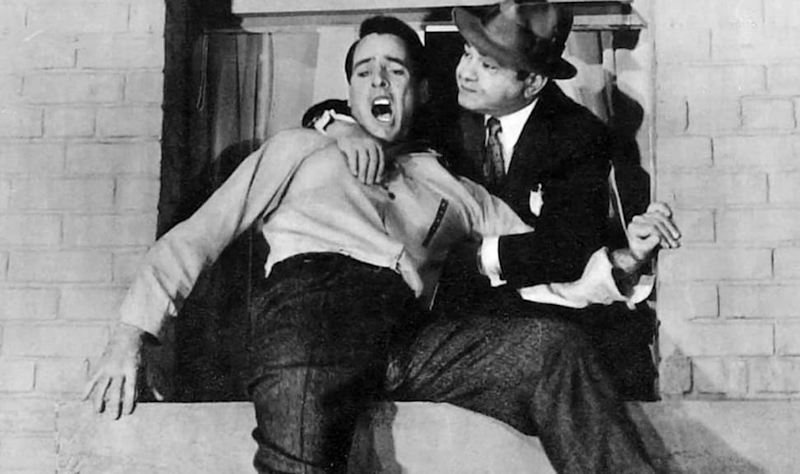Before there was Alfred Hitchcock’s Vertigo (1958), there was Maxwell Shane’s 1956 Nightmare. Although Vertigo is a film in a class of its own, it shares many similar themes as Nightmare; anxiety, dread, and gaslighting. The main protagonist is in an unending hell from which there’s no exit.
Based on Cornell Woolrich’s 1941 novella, And So to Death (whose stories and novels have been adapted into many noir films and mysteries, including Hitchcock’s 1954 Rear Window), Nightmare features Kevin McCarthy as the New Orleans musician, Stan Grayson, who has a nightmare that he has committed a murder. The trouble is he doesn’t remember it entirely, especially since he can’t recognize the man he was supposed to have murdered.
Edward G. Robinson (who had top billing in the film) plays Stan’s brother-in-law, Rene Bressard, who also happens to be a police detective. Not knowing where to turn, Stan confides in Rene about his nightmare. At first, Rene dismisses it as just work fatigue, and advises Stan to get some rest. If only Stan took some vacation, he’d be fine.
Stan’s girl, Gina, is also concerned, but her help seems to be useless. Stan is rejecting everyone’s “help,” and thinks he has no choice but to deal with this problem by himself. His descent into madness is punctuated throughout the film by a song that he can’t recognize. Its strange distortion and slowness in his mind makes matters worse, and even trying to solve the mystery of the song proves an impossible task. We see Stan going from one bar and club to the next; neon lights imposing themselves, signs that are about to swallow him up, and throw him into the night’s abyss. No jazz or big band musician has heard of this tune that’s led Stan into madness.
As the information comes to light that there was a man who was murdered, and who corresponds to Stan’s nightmare, Rene becomes suspicious. Suddenly, Stan isn’t a dear brother-in-law but a chief suspect in a murder investigation.
Robinson’s Rene is unrelenting, and we see here the echoes of Robinson as Mr. Wilson in Orson Welles’ 1946 The Stranger, and Barton Keyes in Billy Wilder’s 1944 Double Indemnity. In all cases, Robinson plays a character, who’s more concerned with justice than people. For him, justice is indeed blind, and he’s willing to see an investigation through, regardless if the suspect is a brother-in-law, a dear friend and colleague at work.
Robinson’s own life was far from perfect during the filming of Nightmare. He considered this a B-picture, and not anything to be proud of. It was just another in a series of films in which a “former movie star” (as he calls himself in his memoir, All My Yesterdays) was able to get work. “And so, on and on,” writes Robinson, “the series of program movies that I did for the money and something to do, my own self-esteem decreasing by the hour. Hell on Frisco Bay I did, and it was hell in Beverly Hills. Nightmare, I did, and it was nightmare all around me.”
Robinson’s personal life and everything around him was falling apart. His son, Manny “was getting a divorce and was in more trouble—and Gladys was having recurrent episodes and once again demanding a divorce as well. Nightmare wasn’t a picture; it was a fact of life.”
It wasn’t just Robinson’s marriage that was falling apart, as well as his son’s own life. According to Robinson, his career was failing because of his age and “former political leanings.” He was accused of being a Communist, and even though Robinson was most likely duped by Communist organizations to donate money to the anti-fascist and justice/labor related causes, he couldn’t shake off that label. He was a marked man, and spent most of his life in sadness, trying to destroy that inaccuracy about his character.
As much as Robinson puts down his role in Nightmare, his talent still emerges. One can even overlook his extreme self-criticism (it’s clear that status in Hollywood has meant a great deal to him) as well as a hint of harmless artistic elitism precisely because almost every performance he has given is unique and strong. Robinson had such a powerful presence on screen that he could’ve been read a nursery rhyme, and would’ve made more impact than a dramatic role in the hands of a mediocre actor.
Nightmare, just like Woolrich’s novella, may be associated with pulp fiction, and something to look down upon, but most films and stories during this period revealed a dark nature of humanity. The characters are suffering in a variety of ways, and ultimately trying to escape themselves. This is impossible. Even the endings that are somewhat more optimistic leave us with the certain knowledge that the dark presence of existential dread will always be following these Americans in trouble.

